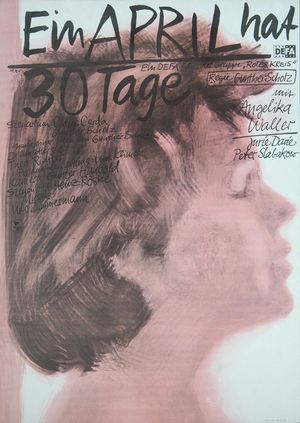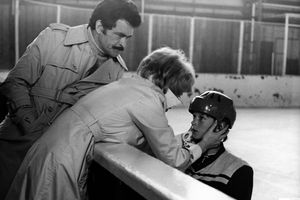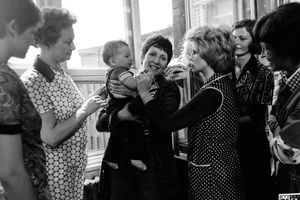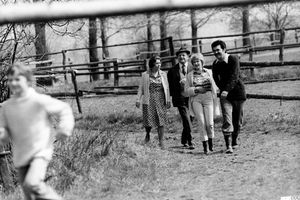Ein April hat 30 Tage
Director: Gunther Scholz, 89 Min., Color, Feature Film
Deutsche Demokratische Republik (DDR)
DEFA-Studio für Spielfilme, 1978
- Film/Video Format
- 35 mm
- Length in m
- 2439
- English Title
- April Has Thirty Days
- Premiere Date
- Release Date (for Cinema)

(Dir.: Gunther Scholz, 1978) Graphic Design: Hans-Eberhard Ernst
Short Summary (English)
On April 1st, single mother Maria and her ten-year-old son Micha move into a new apartment located in the Berlin district Marzahn. On the very first evening, Maria gets an invitation from her neighbor Alvaro, a political emigrant from Uruguay who keeps working for his country’s Communist Party while staying in the GDR. Maria and Alvaro fall passionately in love. Even Micha, who is suspicious of Alvaro in the beginning, eventually becomes friend with him. Thus, nothing stands in the way of their happiness - except for the certainty that Alvaro will have to leave as soon as he gets a new assignment. It happens on April 30th: Maria accompanies Alvaro to the airport, sensing that it will be a goodbye forever.
(Source: filmportal)

(Dir.: Gunther Scholz, 1978) Photography: Hans-Joachim Zillmer

(Dir.: Gunther Scholz, 1978) Photography: Hans-Joachim Zillmer
Film Crew
- Director
-
- Gunther Scholz
- Script
-
- Gunther Scholz
- Scenario
-
- Carlos Cerda
- Gunther Scholz
- Camera
-
- Günter Haubold
- Film Editing
-
- Erika Lehmphul
- Cast
-
- Angelika Waller (Maria)
- Iurie Darie (Alvaro)
- Peter Slabakow (Antonio)
- Roland Kubenz (Micha)
- Sieglinde Aoulong (Elke)
- Carmen Araya (Eine Genossin)
- Hernes Baison (Guillermo)
- Gertrud (auch: Trude) Bechmann (Frau mit Schleier)
- Gisela Bestehorn (Brigademitglied)
- Lydia Billiet (Brigademitglied)
- Eva-Maria Eisenhardt (Brigademitglied)
- Gianina Gilge (Brigademitglied)
- Sina Fiedler (Brigademitglied)
- Birgit Frohriep (Brigademitglied)
- Roswitha Hirsch (Brigademitglied)
- Martina Klebe (Brigademitglied)
- Christine Lechle (Brigademitglied)
- Andrea Schulze (Brigademitglied)
- Erika Westphal (Brigademitglied)
- Trude Brentina (Altes Ehepaar (Frau))
- Holger Eckert (Altes Ehepaar (Mann))
- Bert Brunn (Vater)
- Rudolf Donath (BGLer)
- Jürgen Hentsch (Arzt)
- Hans Klering (Mann in Ausstellung)
- Ostara Körner (Mutter)
- Jörg Panknin (Zahnarzt)
- Anibal Reyna (Neuer Genosse)
- Omar Saavedra Santis (Juan)
- Gisa Stoll (Schwester beim Zahnarzt)
- Naldy Hernandez (Marta)
- Eberhardt Wintzen (Wolga-Fahrer)
- Horst Düring (Marias erster Mann)
- Harald Fischer (Fotograf)
- Marco Kranz (Michas Freund)
- Fiorito Isabel Ortiz (Elena)
- Christiane Barckhausen (Dolmetscherin)
- Carlos Cerda (Enrique)
- Assistant Director
-
- Harald Fischer (Assistenz-Regie)
- Assistant Camera
-
- Andreas Walle
- Production Design
-
- Heinz Röske
- Script Editing
-
- Thea Richter
- Music
-
- Udo Zimmermann
- Victor Jara (Lied "El manifiesto")
- Sound
-
- Werner Dibowski
- Gerhard Ribbeck
- Costume Design
-
- Regina Viertel
- Make-Up
-
- Heinz Kosse
- Berta Fritze
- Production Management
-
- Uwe Klimek
- Unit Production Management
-
- Harald Andreas
- Frank Lamla
- DEFA Photography
-
- Hans-Joachim (auch: Jochen) Zillmer
- Dubbing (Dubbing Actor)
-
- Jorge Arrue (Guillermo)
- Gladys Pontoni (Marta)
- Maria Theresa San Martin (Elena)
Awards
- Kunstpreis des FGDB (1979): Kunstpreis des FGDB - Iurie Darie
- Kunstpreis des FGDB (1979): Kunstpreis des FGDB - Thea Richter
- Kunstpreis des FGDB (1979): Kunstpreis des FGDB - Gunther Scholz
- Kunstpreis des FGDB (1979): Kunstpreis des FGDB - Angelika Waller
- Kunstpreis des FGDB (1979): Kunstpreis des FGDB - Carlos Cerda
- Kunstpreis des FGDB (1979): Kunstpreis des FGDB - Günter Haubold
Short Summary (German)
Maria, alleinstehend mit einem zehnjährigen Sohn, bezieht am 1. April ihre neue Wohnung in Berlin-Marzahn. Von ihrem Nachbarn Alvaro, einem Ausländer, wird sie für den Abend eingeladen. Sie erfährt, dass er politischer Emigrant aus Uruguay ist und weiter für die Kommunistische Partei seines Heimatlandes arbeitet. Die beiden verlieben sich ineinander, Maria lernt seine Tätigkeit und seine Freunde kennen, stellt ihn auch ihren Eltern vor. Sohn Micha freundet sich nach anfänglichem Zögern mit ihm an. Doch Maria weiß, daß es eine Liebe auf Zeit ist, denn Alvaro wird eines Tages von seinen Genossen einen neuen Auftrag erhalten und weggehen. Der Tag kommt eher als geglaubt. Am 30. April begleitet sie ihn zum Flugplatz. Es ist ein Abschied für immer.
(Quelle: Das zweite Leben der Filmstadt Babelsberg. DEFA-Spielfilme 1946-1992)
Short Summary (Other Languages)
Un primo d'aprile Maria si trasferisce con il figlio in un appartamento di Berlino-Marzahn. Alvaro, il suo vicino di casa, la invita a cena e le racconta di essere un profugo politico uruguayano, emigrato in Germania per sostenere i partito comunista del suo Paese. I due s'innamorano, ma Maria sa già, che si tratta di un amore a tempo determinato. Il 30 dello stesso mese, infatti, Alvaro riceve un nuovo incarico e se ne andrà via per sempre. (Italienisch)



